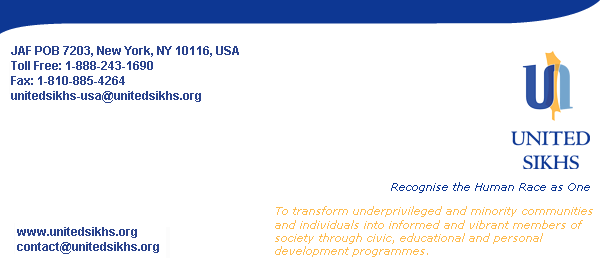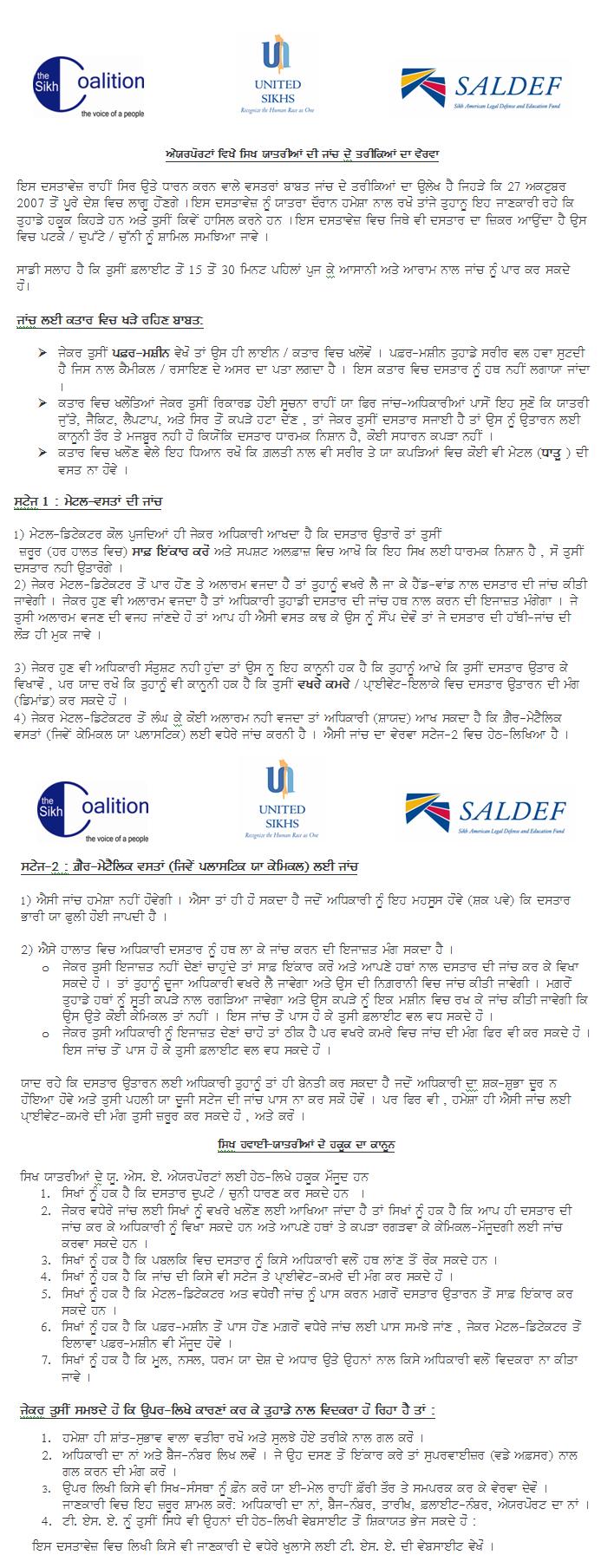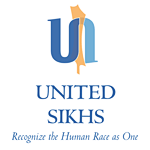
Please Be Involved, Click here and Join UNITED SIKHS
To receive forthcoming bulletins join our UNITED SIKHS Yahoo group
To donate go to www.unitedsikhs.org/donate
This Community Voice may be read online at: https://www.unitedsikhs.org/PressReleases/COMVCE-27-10-2007-00.htm
Community Voice
27th Oct 2007
12th Kattak 539 Nanakshahi
UNITED SIKHS, Sikh Coalition and SALDEF Publishes Airport Screening Procedures for Sikh Travelers - In Relation to New Procedures to be Rolled out by TSA Tomorrow
In a successful collaborative effort, three Sikh American organizations worked closely on a daily basis to secure a revision of TSA procedures affecting Sikh Travelers
New York - New procedures will go into effect tomorrow with respect to screening the turban at USA airports. To help Sikh travelers go through the screening process at US airports, UNITED SIKHS, the Sikh Coalition and Sikh American Legal Defense and Education Fund (SALDEF) have developed "A Sikh Traveler's Guide".
Report Here Your Turban Screening Experience at US Airports, whether pleasant or otherwise |
[English version] [Panjabi version] |
| Timelines for the Sikh American Organizations’ campaign to secure a revision of TSA screening procedures | |
The "Sikh Traveler's Guide" below ( In English and Panjabi) contains a detailed description of the Transportation Security Administration (TSA) head covering screening policy and steps to be taken if you are wearing a turban. The document also describes your rights as a traveler through America's airports. This guide may be downloaded at the following links:
Airport Screening Procedures for Sikh Travelers (See Panjabi version below)
This document details headwear screening procedures that will be in effect beginning on October 27, 2007 at all United States airports. Keep this document with you while you travel through the U.S., so that you know what to expect and how to assert your rights. All references to “turban” below also include patkas or religious headscarves.
To clear the new procedure, we recommend that you arrive at the airport 15-30 minutes earlier than usual.
Standing in Line for Security Screening:
- If you see a “puffer” machine at the airport, request to stand in the line that goes to the “puffer” machine. The “puffer” is a portal machine that blows air at your body to pick up traces of chemicals. It does not involve touching your turban.
- While standing in line for your security screening, you may hear recorded announcements or Transportation Security Officers (TSOs) telling passengers to remove their shoes, jackets, laptops, headwear, and other items. If you wear a turban, you should disregard that warning, since it does not apply to passengers wearing religious head coverings.
- While in line, please ensure that you have not accidentally left any metallic objects on your person.
Stage 1: Metal Detection Screening
1. When you walk up to the metal detector machine, a TSO may ask you to remove your headwear. You MUST tell the TSO that you will not remove your turban, since it is a religious article.2. If you walk through the metal detector and the alarm goes off, you may be pulled aside for further screening. The screener should use a hand wand to check the turban. If the hand wand sounds an alarm around your head, the screener may want to pat-down your turban. If you know the source of the alarm, you may consider surrendering the object to possibly avoid the need for a pat-down.
3. If, after the pat-down, the TSO is unable to resolve the concern, he/she can ask you to remove your turban, BUT only in a private area.
4. If you walk through the metal detector and no alarm sounds, a TSO MAY determine that additional screening is needed and ask you to step aside. This is described in Stage 2 below.
Stage 2: Screening for Non-Metallic Items
1. You may be selected for non-metallic screening. This will not happen every time. It is at the discretion of the individual TSO, if they believe your turban is “bulky.”
2. If you are selected for the additional screening, the TSO will ask you if he/she can pat down your turban as soon as you step out of the metal detector.
a. If you do NOT want the TSO to touch your turban, you MUST refuse and say that you prefer to pat down your own turban. You will then be taken aside by a different TSO who will supervise you as you pat down your turban. After the pat-down, the TSO will rub your hands with a small cotton cloth and place it in a machine to test for chemical residue. If you pass the chemical residue test, you should be allowed to proceed to your flight.
b. If, on the other hand, it is acceptable to you for the TSO to touch your turban, let the TSO do so. The TSO should offer you a private area for this screening. If the TSO does not, you can ask for one. Once you clear this screening, you should be allowed to proceed to your flight.The only time a TSA officer can request a removal of your turban is if the TSO cannot resolve the concern and you did not clear the metal detector or the additional screening. If that happens, you should ALWAYS ask for a private screening area to conduct the removal of your turban.
Sikh Air Travelers’ Bill of Rights
Sikhs who are clearing security at United States airports have the following rights:
1. Sikhs have the right to wear turbans, patkas or religious scarves during security screenings in US airports.
2. Sikhs, if selected for additional screening, have the right to ask to pat-down their own turbans and have their hands swabbed for chemical residue, instead of allowing a Transportation Security Officer (“TSO”) to pat-down their turbans.
3. Sikhs have the right to refuse to remove their turbans in public.
4. Sikhs have the right to ask for a private area during any stage of the security screening.
5. Sikhs have the right to refuse to remove their turbans if they have successfully cleared the metal detection procedure and an additional screening pat-down.
6. Sikhs have the right to ask to be cleared for additional screening by going through a “puffer machine,” if one is available, together with a metal detector.
7. Sikhs have the right not to be racially profiled by TSOs on the basis of their ethnicity, race, religion or national origin.
If you feel you are being mistreated or singled out for screening because of your turban, remember to do the following:
1. Stay calm. Treat and speak with the TSO professionally.
2. Ask the TSO for his/her name and badge number. Write this information down. They are required to give this information to you. If they refuse, ask to speak with a supervisor.3. Call or email one of the Sikh organizations listed above to report the incident as soon as possible after it has occurred. You will need to tell them the name and badge number of the officer, the date of the incident, your flight number, the airport where it occurred, and about the incident.
4. You can also file a complaint with the TSA on your own on their website at http://www.tsa.dhs.gov/research/civilrights/civilrights_travelers.shtm. You can also refer to the TSA’s website for more information on any procedure described here.
You may read a previous press release on the TSA screening procedures at https://www.unitedsikhs.org/PressReleases/COMVCE-17-10-2007-00.htm

http://www.tsa.dhs.gov/research/civilrights/civilrights_travelers.shtm
Issued by
Kuldip Singh
Director
UNITED SIKHS
646 315 3909
Our Mission
To transform underprivileged and minority communities and individuals into informed and vibrant members of society through civic, educational and personal development programs, by fostering active participation in social and economic activity.
UNITED SIKHS is also an avenue for networking between like-minded organisations to establish and nurture meaningful projects and dialogues - whether social, cultural or political- to promote harmony, understanding and reciprocity in our villages, towns and cities.
UNITED SIKHS is a coalition of organisations and individuals, who share a common vision based on the belief that there is no greater endeavour than to serve, empower and uplift fellow beings. The core of our philosophy is an unwavering commitment to civic service and social progress on behalf of the common good.
Accordingly, UNITED SIKHS has sought to fulfil its mission not only by informing, educating and uplifting fellow beings but also by participating in cross-cultural and political exchanges to ensure that the promises and benefits of democracy are realized by all.
We at UNITED SIKHS believe that the development of enlightened and progressive societies can be made possible by socially conscious groups of people who make a commitment to develop and direct human potential. Our work, efforts and achievements stand as a testament to our faith in this vision.


